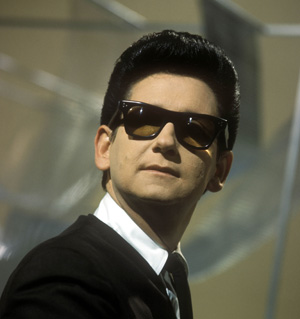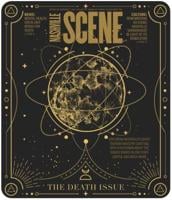Fred Foster thought a young Roy Orbison—pale, scrawny and exceedingly reticent—was the antithesis of a rock star when the two met in early 1959. Orbison wasn't overly excited about meeting Foster, either. The ghostly West Texas singer slept through the start of his first Nashville recording session with Monument Records, which Foster owned. Rustled from his hotel bed more than an hour after he was scheduled to start work at RCA Studio B, Orbison arrived at the session underwhelmed at the prospect of recording for an unproven, newly formed independent label.
But Orbison would quickly change his tune. Despite its tentative start, the creative relationship of Orbison and Foster would indeed prove monumental; the music they created would influence generations of singers across a variety of genres. With the 20th anniversary of Orbison's death on Dec. 6, and with the recent release of a career-defining box set, Roy Orbison: The Soul of Rock and Roll, it's an apt time to reflect on how several of pop music's most timeless and artful songs unexpectedly emerged from a small Nashville recording studio on 17th Avenue.
By the time Orbison met Foster, the singer had rushed through two significant record deals, and his career teetered toward oblivion. Sam Phillips, through his label Sun Records, had produced a series of Orbison singles, and though "Ooby Dooby" and "Rockhouse" are prized by rockabilly fans today, they were only minor regional hits. Orbison's work on Sun didn't establish him as a groundbreaking stylist in the way it had for labelmates Elvis Presley, Jerry Lee Lewis, Carl Perkins and Johnny Cash.
Orbison left Sun and Memphis to sign with RCA Records and to work with Chet Atkins in Nashville, hoping to capture the stardust Atkins sprinkled on rock hits by Elvis and the Everly Brothers. But after one unsuccessful single, RCA refused to put out a second, deeming the follow-up recording as too weak.
By late 1958, Orbison must've wondered if his dream of was over. "He told me he and his wife Claudette would take flour and water, roll them into balls and fry them," Foster says. "That would be their meal."
Orbison was managed by Wesley Rose, head of the music publishing powerhouse Acuff-Rose Publications. One afternoon, Rose ran into Foster, a Maryland resident in town to record songs for the label he'd started a few months earlier. Rose asked Foster if he'd consider signing the floundering Orbison.
Foster had a willingness to gamble—and little to lose. A veteran record promoter in the D.C. area, Foster had enjoyed one hit with his new label in its first year, Billy Grammer's "Gotta Travel On." The second act Foster signed, Billy Graves, abruptly quit after three singles, saying the performing life wasn't for him.
Orbison wasn't exactly thrilled that, after the excitement of signing with RCA, he'd so quickly found himself with a little-known upstart. Boudleaux Bryant once told Foster that Orbison looked at the move from RCA to Monument as "trading a mule for a picture of a racehorse."
Rose demanded that Foster re-record the single RCA had passed on. When released on Monument, it did just as poorly as RCA had predicted.
After that, Foster asserted himself. The producer thought Orbison's voice, with its fragile beauty, got lost amid the forceful thump of rocking arrangements. Foster wanted the arrangements to have more space to showcase Orbison's voice, and he wanted to bring in a string section and harmony singers to soften the background. When Rose walked into the session for "Uptown," Orbison's next recording, he chastised Foster for hiring so many fiddle players. "They're violinists, Wes," Foster replied. Rose retorted, "Well, you're wasting your money."
"Uptown" was a finger-snapping tune, yet a bit more sophisticated than Orbison's rockabilly work. It succeeded enough to encourage the ambitious Foster. He decided to spend several weeks with Orbison, encouraging his songwriting. The songs Orbison played for Foster included a dramatic teen-death ballad, a popular theme at the time, and a sketchy tune with the title "Only the Lonely" that the producer liked, but thought was too short and unfinished.
The death ballad, "Come Back to Me My Love," featured a background vocal segment that went, "Dum dum dum, dum bee doo wah," which Foster liked. One sleepy-eyed morning, as he crossed a parking lot on his way for coffee, he hummed this vocal part, but then, instead of the original song's chorus, he hummed the chorus of "Only the Lonely."
Foster doesn't know why the idea to combine parts of two songs dawned on him; it just presented itself as a gift. "I ran back to Roy's room, woke him up and said, 'We've got it,' " says Foster, now 77 years old and still active as a producer. Orbison tried the re-figured song on guitar, and it worked.
Foster organized a recording session for the next day. Anita Kerr, Nashville's best string and vocal arranger, brought her harmony quartet. She helped with the song's arrangement, but on the first take, Foster thought the harmonies sounded too polished for the moody song.
"Joe Melson, who co-wrote 'Only the Lonely,' was a singer too, and his voice had more air than tongue," Foster says. "I told him, 'Get in there and sing with Anita's quartet.' I featured his voice up front, but the quartet gave the harmonies the weight they needed."
Still, Foster had difficulty getting Orbison's voice above all the supporting musicians. Studio B was packed with six string players, five background singers and a core band of guitarists Harold Bradley and Hank Garland, pianist Floyd Cramer, drummer Buddy Harman and bassist Bob Moore. "Roy was so tentative with his voice back then," Foster says. "I loved him, I loved the way he sounded, if I could just get him out there more."
To help, Foster and engineer Bill Porter devised a way to create a buffer between the singer and his supporters. "I said, 'Bill, what if we put Roy behind the coat rack, and cover it with coats? Would that keep these musicians from bleeding into his mic?'" They tried it, but it wasn't enough. So they hung blankets between the band and singer. That's how they captured the vocal featured on the classic recording.
"Only the Lonely," recorded in August 1960, reached No. 2 on the pop charts and established Orbison and Monument Records as fresh forces in the music business. Orbison's grand, operatic voice found its perfect setting, like a rare black diamond set in burnished silver. The exotic rhythms and unusual use of strings and harmonies introduced a sound to pop music as distinct and revolutionary as that of Ray Charles, Chuck Berry, Little Richard and James Brown.
In the early 1960s, an otherwise bleak period in pop music, Orbison expanded the possibilities of rock 'n' roll by giving voice to brooding, lonely outsiders with such subsequent hits as "In Dreams," "Crying," "Blue Bayou," "Dream Baby" and "Oh, Pretty Woman." From 1960 to 1965, Orbison scored 15 Top 40 hits, making him the most important rock star to emerge between the raw blast of the early rockers and the brisk, melodic thrust of the British Invasion and Motown.
All along, the singer and his producer kept experimenting. For Orbison's third top hit, "Running Scared," Foster convinced the singer not to slip into falsetto for the high notes, but to sing them in full voice. Orbison balked at first, saying he couldn't sing that high. But Foster persuaded him to try it, and the results stunned everyone, including Orbison. Hitting those high, remarkable notes became part of his trademark.
Foster last worked with Orbison on "Oh, Pretty Woman," a No. 1 hit, in 1965. The two parted ways because of a background feud between Foster and Rose, who moved Orbison to MGM Records and took over his record production. Orbison didn't have another Top 10 until 1980, when he had his only country hit on a duet with Emmylou Harris on "That Loving You Feeling Again."
In 1988, nearly 30 years after signing with Monument, he returned to the rock charts with several hits as a member of the Traveling Wilburys with Bob Dylan, George Harrison and Tom Petty. When Orbison died unexpectedly of a heart attack on Dec. 6, at age 52, his solo song "You Got It" was climbing the charts. It went on to become his first No. 1 pop hit in 24 years.





